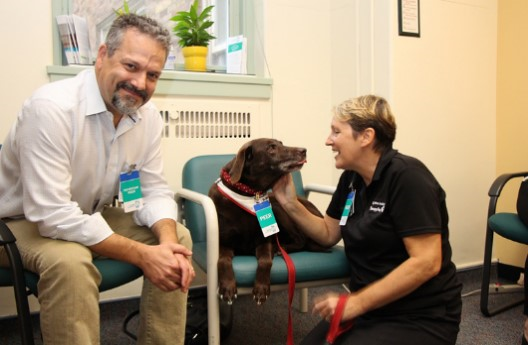
Peer Support & Trauma Response Program
As the first hospital-wide program in Canada, the SickKids Peer Support & Trauma Response Program was launched in 2018 to promote greater psychological health and safety amongst staff, aligning itself closely with the principles of Caring Safely.
Events such as poor patient outcomes, prolonged recovery efforts, medical error, conflict and moral distress are part of the professional landscape and can have a significant impact on mental health and day-to-day functioning of health-care professionals. The cumulative effect can hold consequences not only for the individual, but also for their family, health-care team and public health.
Our program operates 24/7 and is available to all staff and volunteers at SickKids. We also provide consultation and training in the area of mental health and peer support programming to organizations outside SickKids, and are engaged in research to understand occupational stress and inform more responsive organizational processes.
Why peer support?
Peer support can be influential to colleagues in reducing distress and encouraging resiliency. Peers occupy a critical role in providing responsive psychological and emotional support through their shared experiences and are instrumental in directing affected colleagues to needed resources. Cornerstones of the program include:
- capacity-building
- post-traumatic growth
- reducing stigmatization of mental health issues
- increased awareness
Peers provide confidential individual support and outreach to colleagues, and through delivery of trauma response, they are able to provide opportunity for teams to engage in psychological decompression and debriefing following a critical incident. This responsive level of intervention facilitates re-stabilization of the affected team and creates a focused environment of cohesion and support for its members. Peers can make a permanent impact on a colleague’s mental health journey and contribute to the prevention of additional challenges or issues.

Trained peers
Peers receive customized training including advanced development of communication skills, education in the dimensions of mental health and psychological first aid, training in an individual crisis intervention model, education and fundamental skill development in allyship (equity, diversity & inclusion) and certification in the practice of Critical Incident Stress Management.
The program consists of over 80 clinical, non-clinical, research and physician peers from across disciplines.
What we do
Since the launch of the program in 2018, peers have provided individual and group support to staff in thousands of interactions and are considered a trusted and reliable mental health resource at SickKids. The success and growth of the program has drawn recognition from our peer organizations in a variety of sectors, both locally and internationally. Our program supports organizations moving to establish peer response by offering consultation regarding:
- Peer models of delivery
- Budget
- Program management models
- Policy development
- Impact assessment
- Program planning
- Operationalization
- Resourcing and allocating peers
- Triaging and coordination
- Metrics and program evaluation
- Program sustainability
- Leadership engagement
- Promotion
- Recruitment and screening processes
- Training

Kelly McNaughton
MSW, RSW, CTS, PhD Student, Program Manager, Peer Support & Trauma Response and Organizational Lead, Mental Health

Kate Paulino
Coordinator, Peer Support and Trauma Response Program, Occupational Health and Safety
Our programs
Peer program development and consultation
Consultation is available to health-care organizations who may be contemplating or are in the process of developing a peer support team.
SickKids has tailored program development and team operations towards the healthcare sector, however, programming is informed by experience and knowledge with first responder populations. Mentoring is offered to any organization with a desire to improve the mental health and psychological safety of its employees.
Consultation provides the opportunity to guide organizations in a best practice approach to peer program and team development. Our team assumes a tailored approach from concept and needs assessment through phases of program and mental health awareness promotion, nomination, recruitment, screening, program evaluation and sustainability. Consultation may support the program development process, or inform a phase of team development such as coaching organizations on interviews and psychological screening.
- Development of policy and best practice protocols
- Recommended tools and best practices including over 40 documents developed to support the program and operations
- Considerations in the nomination and recruitment process
- Promotion of mental health and the peer program
- Development of operational and communication infrastructures
- Screening and interview protocols
- Peer training
- Onboarding and implementation
- Sustaining the peer network
- Development of operational and communication infrastructures
- Program evaluation and ongoing training
Peer support training
Training of peers is founded on mental health education and advanced communication skill development in an interactive, psychoeducational workshop aimed at preparing peers for the practical and psychological challenges of supporting their colleagues. Allyship, with a lens to equity, diversity and inclusion, is a central component of this training program.
Training provides essential preparation for peer learners in delivering individual support as well as group intervention to teams following a traumatic event. Simulation exercises with standardized patients enables learners to practice and integrate newly acquired skills in a safe learning environment and provides further opportunity for reflection, guided discussion and real time coaching. Learners develop an essential suite of tools and resources that align with a best practice approach in peer support.
- Understand how to cultivate a therapeutic and trusting connection with colleagues
- Recognize indicators of common mental health issues and how to assess risk
- Advanced development of communication skills
- Knowledge in dimensions of mental health and psychological first aid
- Training in an individual crisis intervention model
- Introduction to Critical Incident Stress Management (CISM)
- Engagement of standardized patient (SPs) for interactive learning and practical skill development
- Learning through blended modalities: video, simulation, observation, large and small group discussion and lecture
Delivered over 14 hours. May be delivered in person or virtually.
This course is designed for anyone in the fields of health care, business, crisis intervention, disaster response, education, emergency services, employee assistance, mental health, military, spiritual care, and trauma. This course is approved by the International Critical Incident Stress Foundation (ICISF), and delivered by Kelly McNaughton, ICISF certified instructor.
Designed to present the core elements of a comprehensive, systematic and multi-component crisis intervention curriculum, the Group Crisis Intervention course will prepare participants to understand the impact of trauma and the traumatic stress reaction as well as crisis intervention and the critical dimensions of mental health. Learners are introduced to a range of crisis intervention approaches and evidence-based techniques. Fundamentals of Critical Incident Stress Management (CISM) are outlined and learners acquire essential knowledge and tools that will enable facilitation of different levels of group crisis intervention, specifically demobilizations, defusing and the Critical Incident Stress Debriefing (CISD).
- Understand and explain Critical Incident Stress Management (CISM)
- Define key terms and concepts in CISM
- Discuss psychological and behavioural reactions to stress and trauma
- Understand Resistance, Resilience and Recovery
- List the elements that must be considered in the strategic planning of crisis interventions
- Learn to assess which type of intervention should be activated following an incident
- Engage in mock Defusing and Debriefing group exercises
- Stages of Crisis
- Principles of Crisis Intervention
- Critical Incident Stress
- Traumatic Stress
- PTSD
- 6 Elements of CISM
- Assessment
- Tactical Components
- Informational Group Interventions
- Defusing
- Critical Incident Stress Debriefing
Delivered over 14 hours. May be delivered in person or virtually.
Contact us
We are all blazing a trail with peer programming to improve mental health and wellbeing of our colleagues in health care. We welcome inquiries or requests for information.
Email: peer.support@sickkids.ca
Phone: 416-813-7654 ext. 201683
Peer Support and Trauma Response Program
Department of Occupational Health and Safety
The Hospital for Sick Children
555 University Avenue
Room 5303, Black Wing, 5th Floor
Toronto, Ontario
Canada
M5G 1X8

